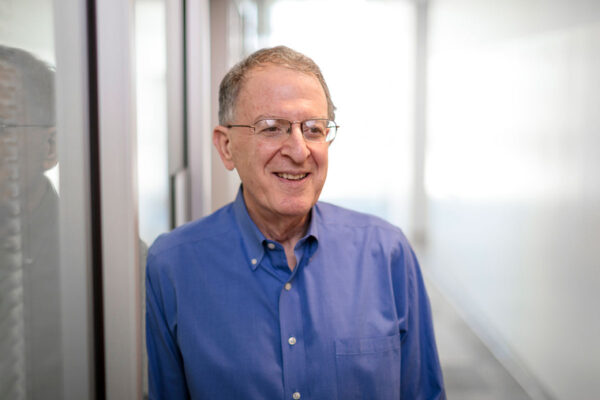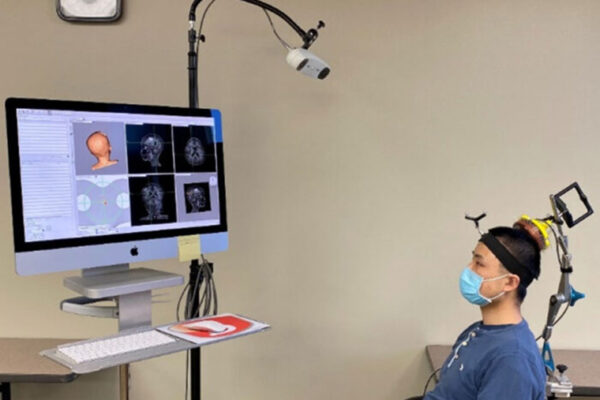Three researchers from Washington University in St. Louis have received highly competitive and prestigious National Institutes of Health (NIH) Director’s awards for “High Risk, High Reward” medical research funding totaling more than $10 million over five years.
Hong Chen, an associate professor of biomedical engineering at the McKelvey School of Engineering and of neurosurgery at the School of Medicine, and Adam Kepecs, the Robert J. Terry Professor of Neuroscience and a professor of psychiatry at the School of Medicine, were among eight nationwide receiving the NIH Director’s Pioneer Award.

Each of the two awards provides a total of $5.4 million to WashU, supporting Chen’s research on using ultrasound to induce a hibernation-like state in mammals and Kepecs’ work on how the brain’s neural circuits decode signals from the immune system to adjust behavior and motivation.
Maria Catalina Camacho, an assistant professor in the Department of Psychiatry at WashU Medicine, received the NIH Director’s Early Independence Award, which is awarded to “promising, newly graduated scientists with the intellect, scientific creativity, drive and maturity” to take an accelerated path to an independent research career. The award provides nearly $1.3 million. She will be studying the neurobiological underpinnings that place some children at risk for developing anxiety or depressive symptoms.
High risk, high reward
The NIH’s High-Risk, High-Reward Research program awarded 67 new research grants this year totaling approximately $207 million. According to the NIH announcement, these awards “enable exceptionally creative scientists to potentially transform biomedical science.”
Four WashU scientists last received this award in 2021.
Chen published results of her initial work using ultrasound to induce torpor, or a hibernation-like state, in Nature Metabolism in 2023. Chen and a multidisciplinary team induced a hibernation-like state in mice by using ultrasound to stimulate the hypothalamus preoptic area in the brain, which helps to regulate body temperature and metabolism. In addition to the mouse, which naturally goes into torpor, Chen and her team induced torpor in a rat, which does not. Their findings showed the first noninvasive and safe method to induce a hibernation-like state by targeting the central nervous system.
“Our overarching goal is to pioneer a platform technique that harnesses ultrasound for the noninvasive and safe induction of artificial hibernation, thereby catalyzing disruptive medical innovations,” Chen said.
A BJC Investigator at WashU Medicine, Kepecs is renowned for his work on brain circuits involved in cognition and decision-making and how these circuits can produce psychiatric symptoms. The Pioneer Award will support his pursuit of an intriguing hypothesis: that immune signals, such as cytokines, are sensed by brain circuits and contribute to mood disorders such as depression. By pursuing how the immune system interacts with neural circuits that are involved in psychiatric disorders, Kepecs and his lab are sailing into unfamiliar waters, seeking to discover how conditions such as depression emerge — and perhaps how to alleviate them.
“If we can identify the relevant neural circuits, we can gain insight into how the brain communicates with the immune system and open immediate opportunities for developing targeted drugs for depression and related conditions,” Kepecs said.
Camacho’s research focuses on how the human brain makes sense of a person’s social and emotional worlds. The grant will help fund a study that will test a computational model of how early experiences shape emotional neurodevelopment. To build such a model, Camacho’s lab will collect data from 3- and 4-year-old children.
“By doing this, we can test hypotheses about how early social experiences shape our brains to learn how to understand emotions,” Camacho said. “We think that early emotional neurodevelopment can set up a child to be more or less vulnerable to developing anxiety or depressive symptoms later in life, so this is an important basic scientific step to understanding how depression and anxiety emerge.”
Beth Miller, Mark Reynolds and Kristina Sauerwein contributed to this story. Visit the McKelvey School of Engineering website for more about Chen and WashU Medicine News for more details about Kepecs‘ and Camacho’s research.


